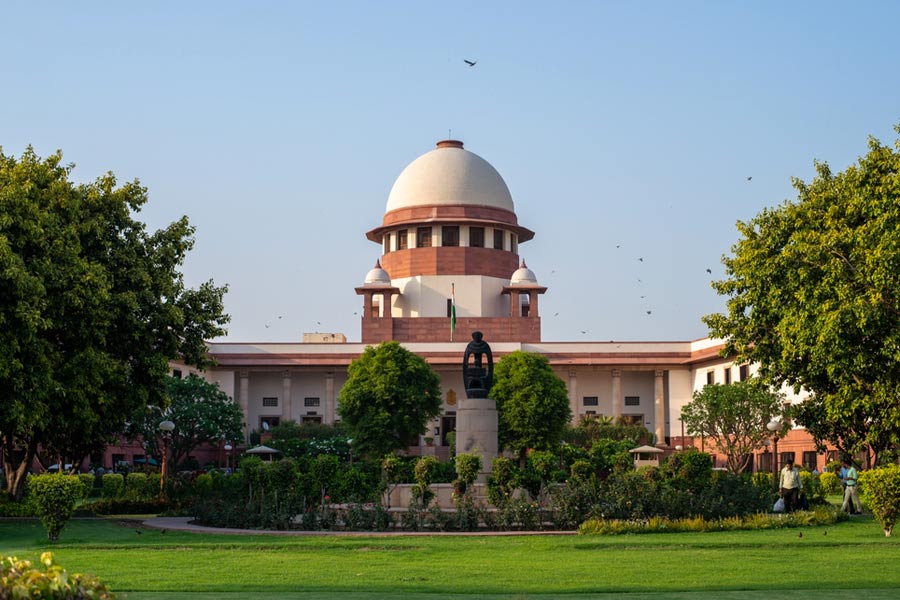The Supreme Court on Monday chided the Uttar Pradesh government for trying to water down the case against the schoolteacher who instigated pupils to slap a fellow Muslim student by avoiding reference to the communal angle in the FIR.
“This is something very serious which we cannot ignore…. Here the teacher is asking students to hit a classmate because he belongs to a particular community,” Justice A.S. Oka, who headed the bench, told additional solicitor-general K.M. Natraj, who appeared for the state government.
“If the allegations are true, this should shock the conscience of the State. If the allegation is correct, this may be the worst kind of physical punishment imparted by a teacher, asking other students to assault another boy.”
Justice Oka added: “There is a prima facie failure on the part of the state to comply with the mandatory objectives of the RTE (Right to Education) Act and Rules.”
The two-judge bench, which included Justice Pankaj Mithal, questioned the state police’s failure to record the allegation by the victim’s father that his son had been targeted because he belonged to a particular community.
“Mr Natraj, we seriously object to the manner in which the FIR is registered by the local police. If you see the first complaint made by the father on the incident, he says that the teacher had made objectionable statements against a particular community. But in the FIR these allegations are not mentioned,” Justice Oka observed.
The bench cut short Natraj’s argument that the incident — which occurred in Muzaffarnagar district last month — was “something” that was being given a communal colour.
“Not just ‘something’, this is very serious. The transcript of the video is there. If a teacher tells her students to hit another student because he belongs to a certain community, what is the quality and sensitivity of the education being imparted?” the bench asked.
It rejected the state government’s argument that petitioner Tushar Gandhi, great-grandson of the Mahatma, was trying to politicise the matter by invoking the Father of the Nation.
“He should not come to the court saying he is the grandson of the Mahatma and all such things,” Natraj had argued.
But advocate Shadan Farasat, appearing for Tushar Gandhi, said he had come to the court as a social worker.
“In a case like this, the state should not be concerned about the locus standi of the petitioner,” the bench said, adding that if necessary, it would treat the matter as suo motu (where the court has taken cognisance of the incident on its own).
Dissatisfied with the probe by the local police, the bench directed that the case be monitored by a senior IPS officer, who must report to the court in three weeks.
It wanted to know the steps taken to counsel not just the victim but the other children whom the teacher had instigated to beat him.
The teacher has been booked under the Juvenile Justice Act besides penal code sections 323 (voluntarily causing hurt) and 503 (criminal intimidation).
The bench later passed a written order — yet to be uploaded — which said: “The probe shall be supervised by a senior police officer nominated by the state government to look into whether these two offences deserve to be invoked. The IPS officer so invited shall submit a report to this court.”
It said “this is a case where the criminal law process was not set in motion and there was violation of fundamental rights and RTE (Right to Education) Act”.
It added: “RTE Act clearly lays down that free and compulsory education should be of satisfactory and equitable quality and there should be norms and standards.
“We may note that there is a complete bar on physical and mental harassment of children. If parents are also made to bear the brunt, then it is the worst form, since here teachers directed other students also.
“There cannot be any quality education if a student is sought to be penalised only on the grounds that he belongs to a particular community.
“We direct the state government to ensure that proper counselling is extended to the victim by a professional counsellor. Even to the students who were dictated to take part in the action. The state will immediately do the needful.”
The order asked the state “what facilities it will extend to the victim… for his quality education” and stressed that “the state cannot expect the child to continue in the same school”.
It asked the state government to place “a compliance report in relation to the victim of the offence” within three weeks.
The next hearing is on October 30.










